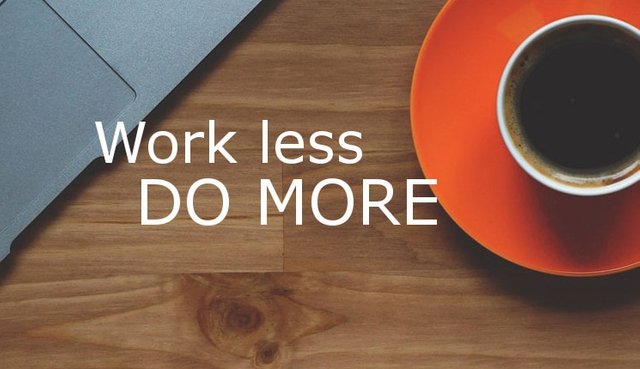It Is Magically Possible To Work Less And Still Do More!
Working long hours is quite common these days. If your Monday to Friday feels like a constant blow of work and projects without real time for a breathing room, it's because you have too much work or is it because you do not spend your time effectively?

It's easy to spend too much time perfecting or just not focusing enough to pull the task out more than you should. So working longer hours, do you mean you are productive and get many done?
The answer is most likely no. When you work consistently long hours or spend too much time on a task, it is usually a sign that you actually only have too much to do. More importantly, it's a sign you do not spend your time, energy and attention wisely.
The Myth About Working More to Get More Done
Our lives are governed by the jobs, tasks and projects we put ourselves or put into our working environment. When you feel that the amount of things you need to do is getting bigger, our natural reaction is working longer on them to get them done.
How many times have you heard someone tell you in an exasperated way that they spent at. 9-9 in the office who is working on something? Our response is usually one of awe in terms of how hardworking they are to be. But are they really?
Productivity is heard to measure, but if one person spent 2 hours on a task, as another could have completed in half an hour, it is more likely to have done the job unnecessarily.
If you work more to get more done, you'll lose your energy both physically and mentally in the long run and potentially make you become a "workaholic". This leads to the fact that you do not produce the results you need optimally and may end up with feelings of error, demotivation and devastation.
What it Really Means to Work Long Hours
While working for long hours, it seems to be the best way to get things done. In practice, it actually means that you actually have less time to recharge and refocus - two things that are crucial to reducing stress and getting more energy. When we have a lot to do, we often focus on the time we invest in carrying out the necessary tasks, but instead we need to be aware of the amount of energy and focus we invest.
Time is completely illusion when it comes to getting things done. The more time you spend at work, the more it is that the minute-by-minute urgency decreases. But when we have limited time, the more we need to focus and use our energy optimally to get it done. The more you control how much time you spend on a task, the more you can control the energy in an efficient way to get it done. An example of this could be the moments when you wanted to leave these college assignments at the last minute - the time-limited pressure has certainly made you channel a larger amount of energy over a shorter period, so you made it done relatively much faster than usual .
The problem that long hours brings is the sense of productivity. Of course, productivity is a good thing, but as Chris Bailey explains in his book The Productivity Project, he tried to lead him to find out that he felt much more productive to work long hours than in shorter outbreak, even though he got the same occupation.
This only shows that busyness does not always correspond to optimal productivity. In fact, productivity is an evasive idea. It's hard to really know how much we achieve each day, but we tend to measure this according to how busy we were. However, it is rarely accurate and can make us think we have achieved more than we could potentially have given a more short and focused approach.
The ‘Less is More’ Approach to Optimal Productivity
First and foremost, when it comes to important tasks, is less more! And so I mean how much time you spend on getting the tasks done. When you do this, there will be a few essential things.
Setting a deadline for yourself motivates you to spend more energy and focus on shorter time.
You create a necessary urgency about the task.
You eliminate many of the procrastination triggers that can occur for long periods of time. This is because you create structure that helps stop the mind bored, frustrated and distracted.
Ideally, you should try to become more aware of your work patterns and productivity levels. As a start, take note of your habits and list which tasks you have completed in a day. Write made how much time it took you to complete each task and use it to reflect on why some tasks took longer than others. Is there a way you could have spent less time completing a task? How could you improve this?
A useful way to keep an eye on the amount of time you spend on things is a productivity tracking app. These automatically monitor your time working on various tasks all on your desk, laptop or mobile device.
Setting deadline reminders for yourself is another way to keep you on track and motivate you to spend your energy wisely in shorter, more focused outbreaks.
So remember to work smart do not work hard. By using our mind optimally means shortening the periods we need to concentrate.
Do not get sucked into believing all the long hours means you've been extra productive. Instead, getting more aware of how to get things done faster with equal efficiency. This will change your life and free more time to live.